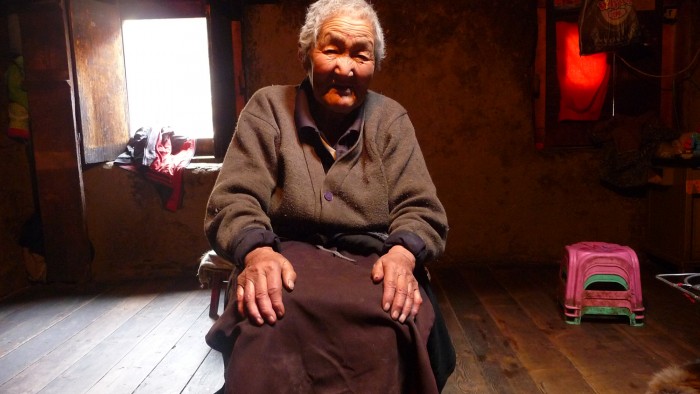 Humanities
Humanities
Native Speaker

A villager from Warming Your Hands With Moonlight, a book by a UO linguistics student about the folk stories and customs of her people.
A young Tibetan woman named G.yu Lha gained a memorable example of the humor of her people when she encountered an uncle one day.
Tasked with a high school project to document her native tongue, the young woman—who goes by a Chinese translation of her name, “Yina”—approached Cho Idan and asked for some proverbs or metaphors.
“I’m not the right person to ask,” her uncle replied. “Asking me is just like warming your hands with moonlight. I’m just an old man who knows nothing.” Then he laughed and went inside.
It was only later that evening, when she asked her mother what her uncle meant, that Yina could see his cleverness. “She explained that ‘warming your hands with moonlight’ meant trying to do something that brings no results,” Yina said. “I was astonished that my uncle had refused my request for a proverb with a proverb, and I had not even noticed.”
The expression became the title of a book that she wrote—her crowning achievement as a talented high school student. It was also the first chapter in the ongoing story of Yina’s remarkable journey, which has brought her to the UO as a linguistics major—part of her ambitious plan to save a dying tongue.
Yina hails from Siyuewu Village, a farming community of 500 or so in a valley near the Dadu River. The language spoken is Khroskyabs—pronounced “tros-gaff”—a unique dialect that is unwritten and spoken only in the local area.
Working with her high school English teacher, Yina spent two years exhaustively interviewing and recording her family and friends, compiling a rich, 250-page book of folk stories and other oral traditions. In a section on figurative speech, for example, Yina notes that when something “has a head and a tail,” it means it has been described clearly and completely.
Yina’s passion for language resonated with her teacher and together they pursued options for continuing her education. His contacts in linguistics included a graduate student at the University of Oregon; Yina applied, and with scholarships from the honors college and the International Cultural Service Program, she arrived on campus in fall 2013.
Majoring in linguistics and minoring in business administration, Yina plans to work with her village to develop livelihoods based on their traditional skills of weaving and handicrafts. She also wants to preserve her people’s customs, culture and language by creating a system to capture Khroskyabs in written form.
Her linguistics training has given Yina the tools she needs to understand her language, not just as a native speaker but also as a scientist. In phonetics and phonology courses, she developed an ear for the nuances in speech patterns; using sophisticated instruments in those classes, she saw how the pronunciation of vowels and consonants rises and falls based on the pitch and intensity in the speaker’s voice.
Department head Scott DeLancey has been a source of inspiration, greeting each discovery about Yina’s language with a burst of infectious excitement.
“When we find out something, he’s like, ‘Oh my gosh, this is so cool, I didn’t know your language does this!’” Yina said. “It makes me want to learn more and dig more to see what’s there.”
DeLancey said Yina will be served well by the department’s international standing in “language description”—that is, instruction in how to write the grammar of a language, starting from scratch. “The really formidable task is analyzing the grammar, which may do things differently from anything you’ve seen before,” he added.
If everything goes as planned, Yina will be back in Siyuewu Village in June 2017. That’s when the real work of instilling pride in her language will begin: The older generation no longer feels that storytelling is valued, as the younger generation increasingly turns to TV and the Internet.
“That will be my biggest challenge,” Yina said, “showing the younger generation the value of their culture.”
―Matt Cooper
Photo: G.yu Lha


 Twitter
Twitter Facebook
Facebook Forward
Forward